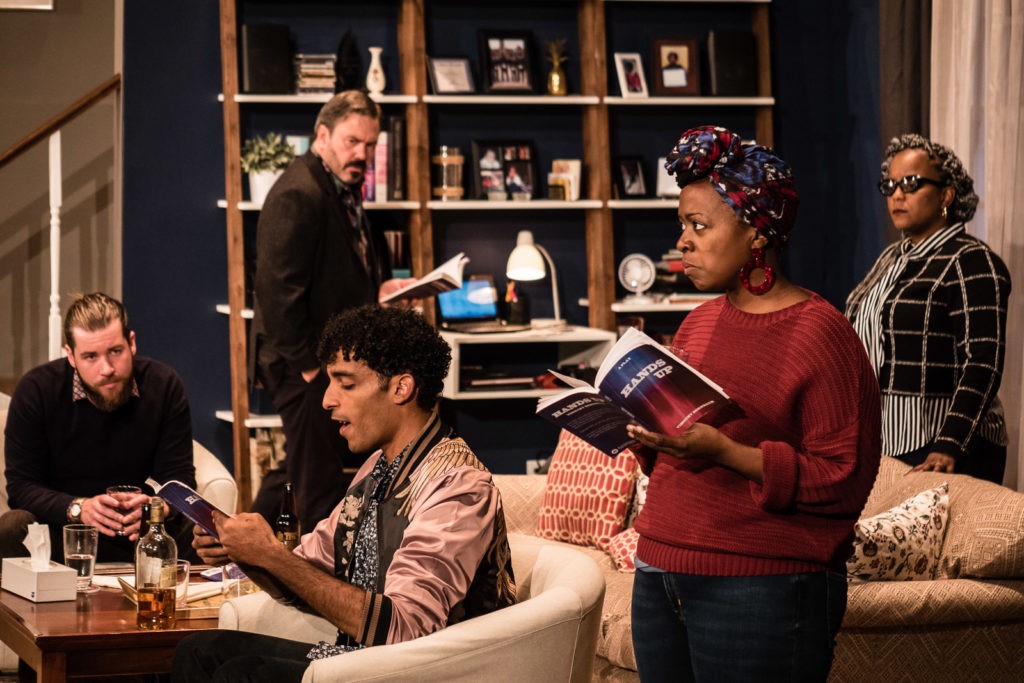GCTC: ‘Bang Bang’ a strong metatheatrical start to the GCTC season

Theatre, by its very nature, breeds more theatre. An interdisciplinary blend of space and of time, theatre-making is unique in its ability to transcend the boundaries of taste that might haunt other artistic disciplines; as such, it is able to tackle more concepts through more stylistic avenues than, say, a song or a painting. Bang Bang by Kat Sandler, presented by the Great Canadian Theatre Company, is singularly self-aware in its exploration of this idea of metatheatre; it anticipates its audience, its discourse, and the contextual parameters to which we as theatregoers have become accustomed, and is quick to defend itself from potential backlash. Bang Bang is a strong start to GCTC’s season in terms of the conversations it starts, and sets a promising standard for future GCTC performances.
Bang Bang’s premise is fairly simple: a white playwright has been offered the rights to film his dramatization of a recent news story, in which a black female cop has shot an unarmed black teenager. The playwright, Tim, shows up unannounced to the cop, Lila’s, home to discuss the film, and brings with him the star of the film, Jackie, and his bodyguard, Tony. Unfolding seemingly in real time, Bang Bang’s strong ensemble wrestles through tough discussions of complicity, legacy, and artistic license, implicating its audience as voyeurs of social discomfort.
Kat Sandler offers a remarkable artistic voice, one feisty enough to withstand inevitable scrutiny of her agency in portraying this story. Sandler’s dialogue is laugh-out-loud funny, and her characters are, for the most part, layered enough to foster empathy. Sandler’s choice to navigate this story through the eyes of Tim, a clueless white playwright, cleverly absolves her of having presented this story through a definitively white gaze; the play is beautifully self-aware in its demographic lens, and featuring Tim as an entry point into this world is a nicely inventive, creative storytelling device. We as an audience have to wonder, though: why is Sandler using her skills in this way, to poke holes in her own privilege? Is artistically dismantling this privilege an adequate excuse to benefit from it, both professionally and financially? Does Ottawa, a 9-to-5 city with a history of transactional cultural representation in its art, understand the privilege it receives in the form of this show, with its accessible white gateway into systemic prejudice? Bang Bang as a script doesn’t provide us with answers to these questions, and shields itself from, by its own estimation, “SJW” recourse. Sandler’s script is a series of knots that only tighten as the story progresses; there’s no right way to untie any of them in this world.
Bronwyn Steinberg’s direction is efficient and adequately nuanced; the continual repetition of finger-guns is a nice, subtle touch, and the relationships fostered between each character are well-supported by physical cues. The second act contains an unfortunate dip into the realm of preachy, but this does not detract from the overall impeccable tone cast to the show. The visual trajectories are smooth, and the humour of the script is given the attention it deserves.
Bang Bang is anchored by two of its actors: Lucinda Davis as Karen and Eric Coates as Tony. Lucinda’s emotional arc is the obvious product of an actor with pride in her craft; the careful balance of love and frustration for her daughter is poignant, and not at all overdone. Davis’ one-liners consistently land, and the way in which she navigates a difficult role reinforces GCTC’s noble aptitude for sustainable excellence throughout its seasons. Coates as Tony is a pleasant surprise; any fears of nepotism are assuaged by his excellent performance. Coates’ Tony is funny without being a caricature; he brings an aloofness and a razor-sharp comic timing that sets the pace for the rest of the performers onstage. Truly, kudos to Davis and to Coates for not only their individual performances, but indeed, their shared moments of quiet chemistry.
Jennifer Goodman’s set design is lovely, with set dressing that evokes who Karen is as a person right off the bat. Indeed, the populating of space outside that of the central action area is a nice metric of growth since GCTC’s middling performance last season, The Mountaintop. Angela Schleihouf’s sound design is fine, with one notable exception: aural rain cues are scattered and somewhat inconsistent, meaning references to the weather outside seem under-developed and tangential to the story playing out onstage. Aside from these minor issues, Bang Bang is technically an impressive product of GCTC’s commitment to professional arts in Ottawa; it is emblematic of a productive relationship between director, cast, and crew, which works to present a thoughtful piece of theatre.
To review Bang Bang as a white critic and artist is to directly engage with its central question: who gets to archive black trauma, and whose voice gets amplified in times of discontent? To critique this show should be to engage in a city-wide debate. Bang Bang‘s ending is too neatly handed to its audience, and the questions it asks certainly come from a place of governmentally-funded privilege. Bang Bang asks the right questions, but perhaps to the wrong audiences; whether this issue lies within its playwriting, its direction, or within GCTC’s season curation is a broader, community-bolstered discussion, one in which we as a populace should be eager to engage. Bang Bang is a risky start to the GCTC year, but indeed, a successful one, and one grounded in an evident desire for edgy, timely discourse.
Bang Bang runs at the Great Canadian Theatre Company through November 10. Tickets are available at www.gctc.ca.